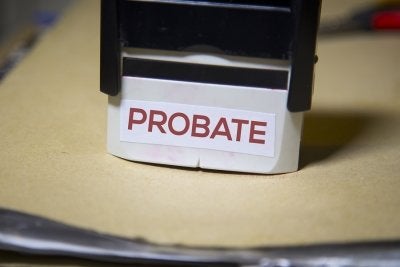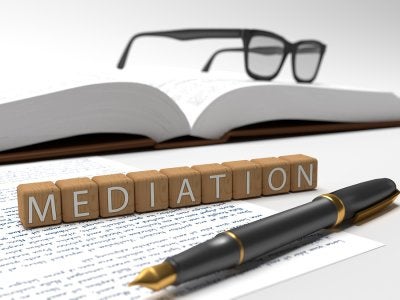-
Separate Revocable Trusts

When you have children and have been through a divorce, it’s natural to be apprehensive about your kids’ future if you decide to marry again. A second marriage often requires much more planning than just a wedding when children are involved. This is especially true if you have assets you want to pass along to your children when you pass away.
If you were to pass away first and didn’t implement a plan, your children could unintentionally get disinherited. A trust may be a solution to ensure your share goes to your children from your first marriage.
What is a Revocable Living Trust?
A living trust, also called a revocable trust, is an account that holds the assets and funds you place in it throughout your lifetime. You can put your home, car, and other assets in the trust’s name.
While alive, you can add, remove or make changes to the trust as often as you like. Once you pass away, the trust becomes irrevocable, and no changes can be made. The designated trustee will then distribute the trust assets and funds per your instructions.
Should We Create a Joint Trust or Separate Revocable Trust?
If you and your second spouse want everything equal, a joint trust may be the right option. But if you want your children to receive your assets or you and your spouse have different ideas for allocation, two separate trusts are advisable. It’s also the best solution if you plan to keep your finances separate. If you have assets and property separately going into the marriage, you may wish to keep them in your family.
There are other benefits to having separate spouse trusts. If your spouse is in financial trouble and has creditors coming after them, having a separate trust can shield your assets from creditor access. In a joint trust, everything is up for grabs to pay for a debt if a creditor comes knocking.
Suppose you or your spouse expect to receive an individual inheritance you’d like to keep separate. In that case, a separate trust is the best choice. A joint trust makes the inheritance equally available to your spouse.
Perhaps the most practical reason to create a separate trust is for tax savings. Maryland has an estate and inheritance tax, often referred to as a death tax. Your heirs may have to pay estate and inheritance tax if your net worth exceeds Maryland’s exemption amount. However, separate spousal trusts allow you to double the tax exemption amount, which could reduce or even eliminate the amount of taxes they owe.
Ready to Set Up Your Separate Spouse Trusts?
Having children from a prior marriage can make finances tricky. If you think two separate spouse trusts are the way to go, are leaning towards a joint trust, or aren’t sure which is the best choice for your situation, contact Mummert Law to schedule a consultation. We can help you figure out which trust solution is best for your family and set them up correctly so there’s no chance of a dispute later.
-
Designating a Guardian and Custodian in Your Will
In the state of Maryland, a child is a minor until he reaches the age of 18, after which he is considered an adult. If you have a minor child under the age of 18, naming a guardian or custodian in your will is an important step toward ensuring he is cared for by an individual you trust in the event that you pass away before your child reaches adulthood. Regardless of whether you have already written a will in Baltimore or are preparing to complete this important task, reviewing or determining your choices for guardian and custodian is important for your child’s future.

Designating a Guardian
A guardian is an individual to whom your child’s care is transferred if both parents pass away. Naming a guardian in your will means you want this person to care for your child as if they were a parent until your child is no longer a minor. Guardians perform all parental duties, including making decisions regarding a child’s upbringing, education, religious teachings, and medical care, so it’s important to choose a person that you trust with your child’s wellbeing. It’s also important to note that if the individual named in your will is not your child’s surviving parent, your wishes could be overridden in court and custody provided to the remaining parent if a judge feels it is the best situation for your child.
Designating a Custodian
Because minor children cannot inherit property or financial assets, you should also name a custodian in your will to handle your child’s inheritance until he reaches a certain age or meets a specific milestone, such as graduating from college. The individual named in your will as your child’s guardian can also serve as his custodian, or you may choose a different person to handle your child’s finances and assets as the custodian. Thus, if you feel the person you want as your child’s guardian is not the best individual to manage his inheritance, you can opt to name a different custodian to protect your child’s financial future.
-
Spotlight on No-Contest Clauses
When you visit an estate lawyer in Baltimore to have your last will and testament drawn up, you might think that the document is beyond anyone else’s ability to challenge. But in fact, after a person dies, a will may be challenged in court. A disgruntled relative might try to claim that the will isn’t valid, for example. This is why you might want to talk to your estate lawyer about including a no-contest clause in your will.
A no-contest clause cannot definitively prevent anyone from challenging the validity of your will in court. However, it can certainly discourage your heirs from trying to do so. For example, if you leave your child $10,000 and your child feels that he or she should have received more, the presence of a no-contest clause means that if your child contests the validity of the will, he or she will receive nothing. On the other hand, if you entirely disinherit the child, then he or she has nothing to lose by attempting to challenge the validity of the will.

-
How Can Assets Be Passed Outside of Probate?
One of the benefits of estate planning with an experience estate attorney in Baltimore is finding ways to help your beneficiaries avoid probate. Probate is long and expensive, and if you don’t set up your estate properly, your assets could be tied up for an extended period of time. Fortunately, an estate lawyer can help you use legal tools that let you pass property to your beneficiaries outside of probate, saving considerable time and money. Here are some of the strategies that can be useful in protecting your assets from probate.

Joint Property Ownership
You can use the right of survivorship to prevent a property from entering probate by owning it jointly. Jointly owned properties automatically pass to the co-owner upon the death of the other owner, with no need for probate. Typically, your estate lawyer will create a legal document that sets out the joint ownership and the right of survivorship. Although married couples usually have joint property ownership, the agreement doesn’t have to be between two spouses. Anyone can create a joint property ownership agreement with any person they wish to inherit the property without having to deal with probate.
Death Beneficiaries
There are certain types of financial accounts that allow you to name a beneficiary to inherit the account when you are gone, thus passing outside of the will and the associated probate process. These accounts include payable on death (POD), transfer on death (TOD), and retirement accounts, including traditional and Roth IRAs and 401(k) accounts. However, keep in mind that an surviving spouse often has a right under the law to some portion of your retirement accounts, so even if you don’t name him or her as the beneficiary, they may automatically receive a least a portion of them. Your estate planning lawyer can help you plan accordingly.
Revocable Living Trusts
Revocable living trusts let you transfer assets to a trustee while you are still alive, with the right to cancel the trust at any time. The trustee becomes the owner, so the property can no longer be included in your estate and will not enter probate upon your death. The trustee will then distribute the assets as instructed by you in documents prepared by your attorney.
-
Tips for Talking to Your Spouse About Estate Planning
Estate planning is one of the most important things you and your spouse will do for your family, but starting the conversation isn’t always easy. Scheduling an appointment with an estate lawyer in Baltimore is a good step, but it can be helpful to have a conversation before your meeting so you can align your priorities and come up with a list of questions. Use these tips for talking to your spouse about estate planning.

Start With Why
Before you begin the estate planning process, discuss why it is important to you and why you want to begin it now. In some cases, you may only have a vague idea that estate planning is something you’re supposed to do and feel like you are at the age to do it. In other instances, you may have very specific goals you want to accomplish. By identifying why you want to make a plan for your estate, you can focus in on your goals and create a framework for your decision making process.
Identify Your Non-Negotiable Points
You and your spouse may have some very specific things you hope to accomplish with your estate, and it’s important for your attorney to understand these needs up-front. You may have a family business that you want to pass on to your heirs in a specific way, or you may have a child with special needs that you want to make preparations for. Make a list of the things your estate must do so you can make sure your plans meet these needs appropriately.
Take a Break When You Disagree
Estate planning should be something you and your spouse feel good about together, not the source of conflict. If your conversation becomes heated over things like making a living will or setting up a trust, take a break. Allowing each other time to think and returning to the conversation when you’re calm again will make the process easier.
-
What to Expect During a Business Dispute Mediation Session
Business disputes can arise over many situations, including miscommunications, disagreements over verbal contracts, and conflicts within your employee pool. Handling business disputes through litigation can be a costly and drawn-out process; by contrast, mediation can help conflicting parties reach an agreement much more quickly, often at lower cost. Knowing what to expect from business dispute mediation in Baltimore can help you better determine whether the mediation process is right for you.

The Role of the Mediator
When you seek business dispute mediation, you and the party with whom you have a conflict will meet with a mediation attorney. This mediator will serve as an impartial third party to help you reach a resolution that is satisfactory to both parties. Prior to your mediation session, you may have the opportunity to speak with the mediation attorney in person or over the phone without the other party present, allowing you to present your side of the story. During mediation, the mediator may take either an active or a passive role, depending on your preferences.
The Process of Conflict Resolution
Mediation is a beneficial conflict resolution process , allowing both parties to discuss and reach a solution in private without the oversight of the public or a judge and courtroom staff. Depending on the type of mediation you prefer, your mediator may simply listen to both parties and point out the pros and cons of the potential solutions offered with complete neutrality. Alternatively, your mediation attorney may take a more active role that involves structuring the discussion and proactively guiding both parties toward a conclusion. Mediation can involve both joint sessions, during which all parties and their attorneys are present, as well as private caucus meetings, which allow each party to meet with the mediator privately as the process continues. Caucus meetings allow the mediator to evaluate both sides of the issue and make better-informed suggestions during joint sessions, and all information discussed during a private caucus remains confidential. Once a solution has been reached, your attorneys will use this information to draw up a legally-binding agreement.
-
What Is Health Care Power of Attorney?
When you give an individual power of attorney , you allow that individual to make legal, financial, or other decisions in your stead. If you choose to grant power of attorney, you may opt to turn over decision-making immediately, or only under certain circumstances. Health care power of attorney is a document that allows a person you trust to make decisions on your behalf in terms of health care and treatment options if you are unable to communicate or make these decisions for yourself. Without this document, health care decisions will fall to family members in an order specified by state law. You can find out more about granting health care power of attorney in this informative video; if you have other questions about this document or about any other aspect of estate planning or will writing, contact your lawyer in Baltimore for personalized answers and advice.
-
Estate Planning Questions to Ask Your Attorney
When you hire an estate planning attorney in Baltimore , it is important to ask the right questions so you can make the best choices for yourself and your heirs. There are many different things to consider when make an estate plan, so it can helpful to prepare your questions in advance so that you don’t overlook anything. Consider adding these questions to your list for your meeting.

What kind of experience do you have?
Estate law can be extremely complex, and it changes frequently. It is important to hire an estate lawyer with experience in the field, rather than an attorney who is simply willing to make a plan for you. The advice and information you get from an experienced attorney is invaluable, and by working with an experienced estate lawyer, you can feel better about the decisions you’re making and how they will impact your heirs.
Can you help me with a trust?
Not all estate planning attorneys are willing or able to help you establish a revocable or irrevocable trust, so if this is one of your goals, ask your prospective attorney up front if he or she can manage your request. There are many advantages to setting up a trust and using it in place of a will for some families, so ideally, your attorney will help you decide if a trust is right for you and assist you in setting it up.
Is it possible to avoid probate?
Many people who are making plans for their estate wish to avoid probate for their heirs if it is possible. Going through probate is time-consuming and costly, and can cause conflict within the surviving family members. Ideally, an estate planning attorney can guide you towards options, like trusts, that can limit the probate process. If it isn’t possible to avoid probate, ask your attorney if he or she will be available to guide your heirs through the process.
-
A Look at the Estate Tax
During the estate planning process, it is important to consider the implications of estate taxes. If you have a sizable estate, estate taxes can command a significant portion of your assets. Fortunately, an estate lawyer in Baltimore can help you plan to reduce or avoid the burden of estate tax on your beneficiaries.
Watch this video to learn more about the estate tax. This tax is levied on an estate that exceeds that year’s benchmark at the rate that is in effect that the person’s time of death. These rates are changed frequently by the government. Through careful estate planning, you can distribute your estate in your will in a way that protects your loved ones from this tax and preserves your resources.
-
Estate Planning for Domestic Partners
For couples who choose domestic partnerships over marriage, protecting legal rights is essential. While married couples enjoy certain privileges under the law, domestic partners are not always afforded the same rights. By working with an estate lawyer in Baltimore with experience with domestic partnerships, you can make plans for your estate and feel confident that your loved ones will be protected after your death.
For domestic partners, the law does not assume that your surviving partner is your intended heir in the same way it does for married couples. This distinction could cause issues for your estate in the probate process, as well as uncomfortable family disputes. By drawing up estate planning documents, you can ensure your estate is administered as you intend. With the help of an estate lawyer, you and your partner can draw up individual wills and various trusts to make your final intentions clear. It is also possible to create trusts that benefit your partner while maintaining your privacy. Consult with an estate lawyer to determine the best estate planning procedures for your specific case.


